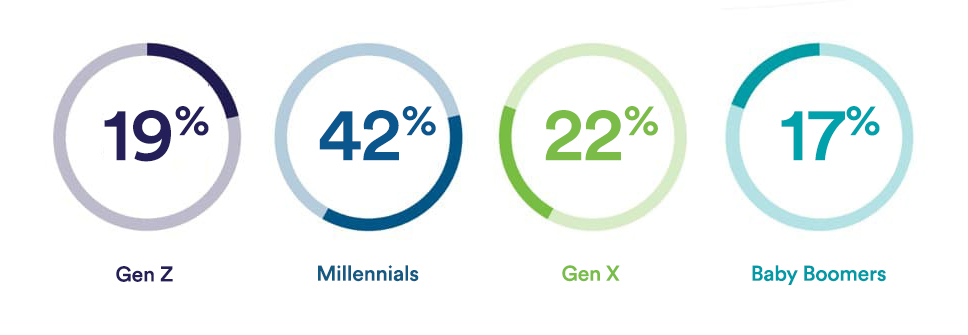The most common image of a digital nomad is that of a single individual moving around the world with his or her laptop, which represents an office and contains all the necessary data to work.
Blogs, videos and Instagram accounts show happy workers (often with animals) in beautiful places, like colourful bars in Mexico or white beaches in Bali. This trend has attracted a lot of attention and established a strong social media presence. When scrolling through one’s Instagram feed it’s become quite normal to come across many digital nomads, associating them with a specific way of life.
Digital nomads are a growing and evolving category of workers, with a +49% increase in 2020 in the US alone (source: MBO Partners). They represent a global movement made up of a diverse group of people of different ages and from all over the world.
This category is not only represented by young people: 39% of US digital nomads are over 40 years old and have a good financial capacity. This is an advantage in countries where the cost of living is lower than in the US, as these people can afford medium to high goods and services, making a positive contribution to the local economy.
Digital nomads and smart workers can be often confused as they both share similar traits, but they are far from the same. Working from holiday homes is just an “event” for the secondo category, whilst it represents a constant element for the first one.
When we talk about travelling, we don’t mean short journeys but long-distance ones, which translates in digital nomads usually spending their wages far from home.

Percentage of digital nomads, according to their generation. Source: MBO Partners
For this reason, especially after the first wave of the COVID pandemic, more and more states have implemented policies to attract digital nomads.
Many have chased each other in proposing tax deductions, infrastructure upgrades (mainly Internet connectivity), residency programmes and even visas dedicated exclusively to digital nomads.
And what about companies?
For now, they seem to be divided into three categories:
- those who ignore the presence of digital nomads in their workforce
- those who are ‘satisfied’ with private agreements with the single employees
- those who have decided to put in place precise policies for this category of people
The last case is what both the market and most global institutional circles are aiming for.
The reason is straightforward: digital nomads often move to countries where taxation, health insurance and labour laws are completely different. Unconsciously, or by deliberately exploiting the situation for financial gain, they can put both themselves and the company for whom they work at risk.
“If you want to get paid New York rates, you work in New York. None of this ‘I’m in Colorado and getting paid like I’m in New York.’ Sorry, that doesn’t work.”James Gorman’s words, CEO of Morgan Stanley, are a clear reflection of the disappointment that many employers are feeling with regard to this situation.
In other cases, the issue can be more serious if the company is not authorised to operate in a particular country.
A Digital Nomad Policy therefore becomes a necessity, especially from a legal point of view. A few examples?
- Creating a list of countries where it’s forbidden to work remotely or establishing a maximum period of time in a given country
- Requiring a periodic backup of data, or providing the worker with a specific company policy for the processing of personal data carried out off company premises. This will help manage the processing according to the directives and precautions indicated by the data controller
The correct handling of personal data, security and privacy protection are fundamental aspects to which one must always pay close attention, especially when working remotely around the world.
The Digital Nomad policy will help companies and digital workers to simplify collaboration procedures. Companies will be able to count on an audience of highly qualified professionals from all over the world and also become a reference point for young talents of the future.

